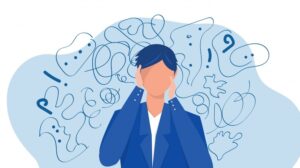If you or a loved one are navigating the challenges of ADHD, you may be curious about alternative approaches to managing symptoms beyond medication. In this blog, we will explore the benefits and options of nonpharmacologic treatment for ADHD. We will delve into the effectiveness of these interventions and how they can empower individuals with ADHD to develop self-management skills and improve their overall functioning. So, let’s dive in and explore the world of nonpharmacologic treatments for ADHD!
Contents
What Is ADHD?
 ADHD, or attention deficit hyperactivity disorder, is a neurodevelopmental disorder that affects both children and adults. It is characterized by symptoms such as difficulty paying attention, impulsivity, and hyperactivity. People with ADHD may struggle with organizing tasks, managing time, and maintaining focus.
ADHD, or attention deficit hyperactivity disorder, is a neurodevelopmental disorder that affects both children and adults. It is characterized by symptoms such as difficulty paying attention, impulsivity, and hyperactivity. People with ADHD may struggle with organizing tasks, managing time, and maintaining focus.
ADHD can impact various aspects of daily life, including school, work, relationships, and overall quality of life. Treatment typically involves a combination of medication, behavioral therapy, and support strategies to manage symptoms and improve functioning.
Is Nonpharmacologic Treatment For ADHD Effective?
Yes, nonpharmacologic treatments can be effective for managing ADHD symptoms, particularly when used as part of a comprehensive treatment plan. Research has shown that nonpharmacologic treatments, such as behavioral therapy, parent training, environmental modifications, exercise, sleep management, dietary modifications, and supportive interventions, can be beneficial in managing ADHD symptoms and improving overall functioning.
Nonpharmacologic Treatment Options For ADHD
Here are some nonpharmacologic treatment options for ADHD in bullet points:
Behavioral therapy
Behavioral therapy is a common nonpharmacologic treatment for ADHD. Cognitive-behavioral therapy (CBT) can help individuals with ADHD develop self-awareness and self-regulation skills. It focuses on identifying and modifying negative thought patterns and behaviors, improving time management and organizational skills, and developing effective coping strategies for managing impulsivity and hyperactivity.
Parent training and education
 Parent training programs can provide parents with strategies and techniques to manage their child’s ADHD symptoms. These programs may focus on establishing routines, setting clear expectations, using positive reinforcement, and implementing effective discipline strategies. Parent education can also help parents understand ADHD better and provide them with tools to support their child’s social, emotional, and behavioral development.
Parent training programs can provide parents with strategies and techniques to manage their child’s ADHD symptoms. These programs may focus on establishing routines, setting clear expectations, using positive reinforcement, and implementing effective discipline strategies. Parent education can also help parents understand ADHD better and provide them with tools to support their child’s social, emotional, and behavioral development.
Environmental modifications
Modifying the environment can help individuals with ADHD manage their symptoms. Creating an organized and structured environment can reduce distractions and enhance focus. This may involve creating a designated study or work area with minimal distractions, using visual cues such as schedules or charts, and implementing strategies to improve time management and organization skills.
Exercise and physical activity
Regular physical activity has been shown to improve cognitive function and self-regulation, which can benefit individuals with ADHD. Engaging in regular exercise or physical activities such as sports, yoga, or other recreational activities can help reduce hyperactivity, improve mood, and enhance overall well-being.
Sleep management
Adequate and consistent sleep patterns are important for individuals with ADHD. Establishing a consistent sleep routine, ensuring a calm bedtime environment, and avoiding stimulants close to bedtime can help improve sleep quality, reduce daytime sleepiness, and enhance cognitive function during the day.
Dietary modifications
 While the impact of diet on ADHD symptoms is still being researched, some studies suggest that certain dietary modifications may be helpful. For example, reducing sugar intake and incorporating foods rich in omega-3 fatty acids, such as fish, nuts, and seeds, may have a positive impact on ADHD symptoms. However, more research is needed to fully understand the relationship between diet and ADHD.
While the impact of diet on ADHD symptoms is still being researched, some studies suggest that certain dietary modifications may be helpful. For example, reducing sugar intake and incorporating foods rich in omega-3 fatty acids, such as fish, nuts, and seeds, may have a positive impact on ADHD symptoms. However, more research is needed to fully understand the relationship between diet and ADHD.
Supportive interventions
Joining support groups or seeking counseling can provide individuals with ADHD and their families with emotional support, education, and coping strategies for managing the challenges associated with ADHD. Supportive interventions can help individuals develop strategies for managing stress, improving self-esteem, and enhancing social skills, which can all impact ADHD symptoms.
Self-Care Tips To Manage ADHD
Here are some self-care tips that may help individuals with ADHD manage their symptoms:
- Establish a routine: Creating and maintaining a consistent daily routine can provide structure and stability, which can be beneficial for managing ADHD symptoms. This includes setting regular times for waking up, eating meals, exercising, working/studying, and going to bed.
- Prioritize tasks: Prioritizing tasks and setting specific goals can help individuals with ADHD stay organized and focused. Breaking tasks into smaller, manageable steps and using tools such as to-do lists, calendars, and reminders can help manage time and responsibilities effectively.
- Practice stress management techniques: ADHD can be accompanied by increased stress and anxiety. Engaging in stress management techniques such as deep breathing, mindfulness, meditation, or exercise can help reduce stress and improve focus and concentration.
- Create an organized environment: Keeping your physical environment organized can reduce distractions and enhance productivity. Decluttering your workspace, keeping important items in designated places, and minimizing unnecessary distractions can help you stay focused and on track.
Remember that self-care strategies may vary for each individual, and it’s important to find what works best for you. Consulting with a healthcare professional, such as a psychiatrist or therapist, can provide tailored recommendations and support in developing an effective self-care routine to manage ADHD symptoms.
Benefits Of Nonpharmacologic Treatment
 There are several benefits of nonpharmacologic treatment for ADHD:
There are several benefits of nonpharmacologic treatment for ADHD:
- Reduced reliance on medication: Nonpharmacologic treatment for ADHD provides an alternative or complementary approach without solely relying on medication. This can be particularly beneficial for individuals who prefer non-medication options or who may have contraindications or concerns about using medication.
- Holistic approach: Nonpharmacologic treatments typically take a holistic approach, addressing various aspects of an individual’s life, including their behavior, environment, lifestyle, and coping skills. This comprehensive approach can result in long-term benefits and improve overall functioning.
- Tailored to individual needs: Nonpharmacologic treatments can be tailored to the individual’s needs and preferences. Treatment plans can be customized to target specific ADHD symptoms or challenges that an individual may be facing, allowing for personalized interventions that meet their unique needs.
- Improves daily functioning: Nonpharmacologic treatments can help individuals with ADHD improve their daily functioning in various areas of life, including school, work, relationships, and daily activities. By addressing specific challenges associated with ADHD, such as impulsivity, hyperactivity, and organization, nonpharmacologic treatments can help individuals better manage their symptoms and enhance their overall functioning.
Conclusion
In conclusion, nonpharmacologic treatments can be a valuable approach to managing ADHD symptoms and improving overall functioning. With a holistic and personalized approach, nonpharmacologic interventions can empower individuals with ADHD to develop self-management skills, enhance daily functioning, and reduce reliance on medication. However, it’s important to remember that every individual is unique, and consulting with a healthcare professional is crucial in determining the most appropriate nonpharmacologic treatments for ADHD. If you or a loved one are struggling with ADHD, don’t hesitate to seek help from a qualified healthcare provider.
For more information, please contact MantraCare. ADHD is a neurodevelopmental disorder involving difficulty paying attention, hyperactivity, and impulsivity. If you have any queries regarding Online ADHD Counseling experienced therapists at MantraCare can help: Book a trial ADHD therapy session.


